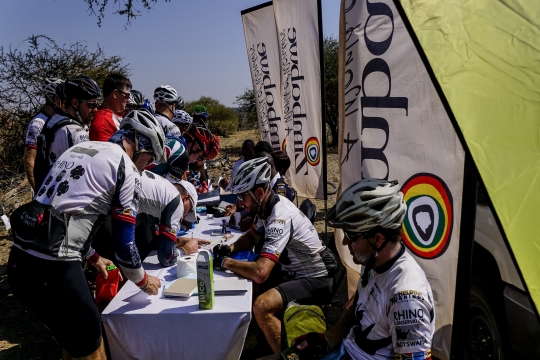JOHANNESBURG, SOUTH AFRICA: When a touring group of 289 mountain bikers needs to cross legally from Botswana into Zimbabwe, and then South Africa (SA), far from any official border posts, it means setting up informal but bureaucratically-sound passport control points in dry river beds or on dirt tracks.
This is precisely what happens in August every year when the Tour de Tuli transboundary mountain bike event sees cyclists pedal 280km through wild country in the vicinity of the Limpopo River, from south-east Botswana, through Zimbabwe, and into SA over the course of four days.
The challenges of dealing with setting up and operating these unusual and temporary border crossings was one of the talking points of tourism analyst and economist, Dr Sue Snyman, when she presented the bike ride as a case study for regional development opportunities at a recent business forum workshop in Johannesburg.
The talk-shop, hosted by the Southern Africa Business Forum (SABF) and the NEPAD Business Foundation, was geared towards an ongoing ‘dialogue’ between the private sector, Southern African Development Community (SADC) member countries, and the SADC secretariat.
Snyman, who works with tourism operator Wilderness Safaris, was discussing how the private sector can help boost business growth within this economic bloc.
‘The Tour de Tuli is one of the main fundraising events for Wilderness Safaris’ Children in the Wilderness environmental educational initiative,’ explains Snyman, ‘and it makes for a good case study in this context, because it identifies some of the challenges in running business and tourism events smoothly between countries across the region.’
As a privately run cross-border event, the Tour de Tuli needs the buy-in of various government departments from three different countries. A trilateral technical committee, representing immigration, tourism, the environment, and revenue authorities from each country, needs to communicate the event’s special needs down to local level bureaucrats.
‘Each year, we have to get written permission to host the event from all three countries,’ explains Snyman, ‘and then we have to make sure that these higher level agreements are communicated to bureaucrats at local level. It would be much easier if we got a written blanket permission, once off, to run the event over a period of say three to five years.’
One year, because local traffic officials hadn’t been briefed about the cycle ride, an event vehicle was impounded and the personnel in it arrested for a few hours, because they were thought to be travelling without the necessary permits, which they did in fact have.
‘We have to deal with the issue of import duties, vehicle taxes, moving currencies between countries legally, making payments across the borders, these are all complicated issues for a business operation to resolve, while at the same time trying to ensure efficient logistics for a high quality event.’ One informal border crossing took up to three hours for individual cyclists to get visas and currencies processed.
Snyman, who is also a research fellow with the University of Cape Town’s Environmental Policy Research Unit (EPRU), was part of a working group at the workshop which dealt with how to enable the movement of services and skills across the region. Other working groups focused on industrialisation and value chains, enabling trade, transport corridors, energy, and water.
Most of the working groups identified banking challenges, lack of skills and infrastructure, and poor communications as major constraints to doing business across the SADC region.
‘Better banking platforms, like SIRESS (the Integrated Regional Electronic Settlement System), will make doing business between member countries much easier,’ Snyman said.
SIRESS is a cross-border payment platform between a number of SADC countries which will eventually be extended to all SADC member countries.
In a situation like that of the Tour de Tuli, where the event organisers are paying suppliers across these countries from the central office in Johannesburg, a platform like SIRESS can do away with the burdensome paperwork required by the Reserve Bank when dealing with different currencies.
These findings will be presented at a meeting of heads of state at a SADC summit to be held in Swaziland in September this year.
Dr Sue Snyman is the group community and culture manager for Wilderness Safaris, a private tourism operation, and regional project director for Children in the Wilderness, both of which operate in six Southern African countries. She is also the vice chair of the IUCN World Commission on Protected Areas (WCPA) Tourism and Protected Areas Specialist Group (TAPAS) and a research fellow with the University of Cape Town’s Environmental Policy Research Unit (EPRU), based in the School of Economics.
